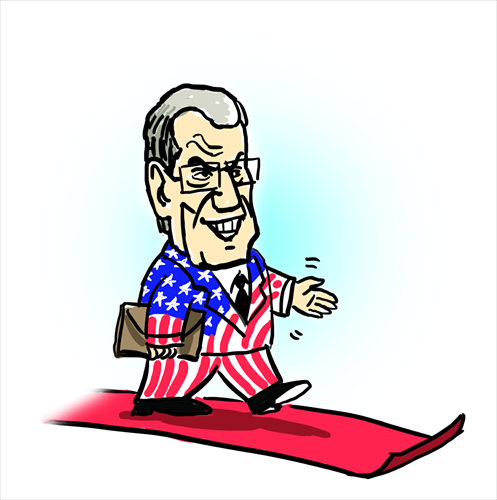HOME >> OP-ED
Baucus pick shows US focus on trade
Source:Global Times Published: 2014-2-13 18:43:01

Illustration: Liu Rui/GT
Earlier this month, the US Senate voted 96 to zero to confirm Democratic Senator Max Baucus as the next US ambassador to China. The acclaimed 72-year-old trade expert will soon be heading for Beijing, succeeding Gary Locke.
I attended a speech by Baucus in Shanghai in the late 1990s, during which he talked about such issues as the trade imbalance between China and the US and the exchange rate of the yuan.
Baucus is proficient in trade issues with China, and hopes to deepen trade relations with China. However, in the light of China's establishment of an Air Defense Identification Zone in the East China Sea, intensifying China-Japan disputes over the Diaoyu Islands and the South China Sea disputes, the trading veteran may be in a disadvantageous position due to his lack of experience in handling security and diplomatic issues between China and the US.
Besides, Baucus will be the first US ambassador for 13 years that cannot speak Putonghua.
But Baucus has been touted as an obvious choice by US President Barack Obama. The strategy of "pivot to Asia" with three pillars is the most important political asset of Obama.
Strategically, the US has shrunk its global ambitions and has identified the Asia-Pacific region as a geostrategic priority. Washington has deployed the best and newest equipment and personnel in the region.
Diplomatically, the US is maneuvering in the Asia-Pacific region, consolidating military alliances and creating trouble for China's rise.
The third pillar is the economic "pivot." The current economic and trade pattern in this region is centered on China, since the country is the biggest trading partner of most countries in the region and 128 countries across the world.
China is also speeding up the convertibility of the yuan under capital accounts and the internationalization of the yuan, moves that are interpreted as challenging the US dollar hegemony in the finance sector.
A sharp drop in US economic and financial clout will undermine the significance of its strategic and military presence. Therefore, Washington has to strengthen its economic influence in the Asia-Pacific region to counterbalance China's increasingly important economic role as well as seize the opportunities of regional economic growth to boost US exports and employment.
Baucus' trade expertise undoubtedly makes him an appropriate choice in strengthening the "pivot to Asia" strategy from the economic perspective.
To some extent, the appointment of the designated ambassador mirrors the fact that Obama's China policy in the remaining years of his second term has turned more pragmatic.
Baucus is considered as a hawk in trade with China. He once signed a letter urging the president to ensure China's compliance with intellectual property rights protections, even bringing a WTO case if necessary.
However, there is no need to overinterpret Baucus' background. US ambassador to China is a political appointment, he is a policy enforcer rather than a policymaker. Hence, he has limited effects on Washington's China policy and the overall Sino-US relationship.
Due to the complicated nature of the bilateral relations, some have labeled the US ambassador to China as the most tricky diplomatic post.
In this position, Baucus will urge China to be a responsible power under the international system led by the US, ensuring US investment interests in a more open Chinese market and improving the US image among Chinese public.
Gary Locke caused quite a stir among Chinese public opinion during his tenure, due to his public stature in China and the turmoil in the Sino-US relations over such controversial issues as the Chen Guangcheng case.
We expect Baucus to stay away from the human rights issue and democratic shows that could hardly politically interrupt the bilateral relations.
In fact, Baucus is relatively pragmatic, and he is expected to handle the complicated bilateral relations with a cool mind to contribute to the establishment of the new type of major power relationship between China and the US.
The article was compiled by Global Times reporter Yu Jincui based on an interview with Wang Yiwei, director of the Institute of International Affairs, Renmin University of China. yujincui@globaltimes.com.cn
Posted in: Viewpoint